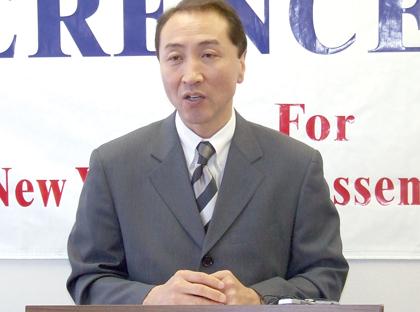By Stephen Stirling
A groundswell of Korean−American political activity has surrounded the race for City Councilman John Liu’s (D−Flushing) soon−to−be−vacated City Council seat, but some leaders say the path to history may not be strength in numbers.
No Korean−American has ever held public office in New York City, but already three members of the ethnic group have expressed interest in succeeding Liu, who became the first Asian−American elected to the Council in 2001.
Two Flushing residents — former legislative aide to Gov. David Paterson Ron Kim and upstart community activist S.J. Jung — have already formally launched campaigns for the office, while longtime Liu Chief−of−Staff John Choe said he has been exploring jumping into the race.
“I think it’s very exciting,” said Flushing Development Center President Fred Fu. “Everywhere things are very exciting right now.”
Yong−Hwa Ha, who was elected president of the Korean American Association of Greater New York in March, said the Korean−American community in the tri−state area is maturing. Ha made organizing the Korean−American community a benchmark of his campaign to become president of KAAGNY, with getting Koreans elected to public office as one of his major goals.
“I think what we are seeing is there are a lot of second−generation Koreans who want to be active, but they need to try to make some kind of connection to the first generation,” Ha said in a recent interview with TimesLedger Newspapers. “They must do that and work with the mainstream population. If they really want to politically move ahead, that’s what they must do.”
But Terence Park, leader of Our Political Coalition, who narrowly lost a bid at the state Assembly in 2006, said it will be very difficult for a Korean−American to win if several are running.
“There are limited registered Democrats who are Koreans in the district, maybe about 2,800,” Park said.
“These three candidates, they are relative newcomers to the district. I think it would be fair to say they will split Korean vote evenly. To win the Democratic primary, one needs to have at least 2,500 or 2,700 votes. That means that they’ll have to get 1,800 for non−Korean voters, which would be very difficult to do as a newcomer.”
Park said he declined to enter the race for this reason, also noting that five other candidates — education advocate Yen Chou, Democratic District Leader James Wu, Holly Civic Association President Isaac Sasson, 27−year−old Constantine Kavadas and Flushing businessman Peter Koo — have also mounted serious campaigns for the seat.
Both Kim and Jung have taken steps to branch out from the Korean−American community early in their campaigns.
Jung launched his campaign in March by announcing he had secured the support of prominent members of African−American, Chinese and Indian leaders in the district. Kim, meanwhile, is campaigning as a third−generation Flushing resident and placing a heavy focus on his legislative experience.
While Choe has not formally announced a campaign, he would likely have the inside track on an endorsement from Liu, which could be pivotal to winning the Democratic primary in September.
But Fu said even if the candidates reach out to other ethnic groups in the diverse district, he believes it is essential to unify the Korean−American base.
“We’re very lucky to have so many qualified candidates,” he said. “But if too many qualified people come out, especially with so many others running, I don’t think they can win. You must have just one person.”
Reach reporter Stephen Stirling by e−mail at sstirling@cnglocal.com or by phone at 718−229−0300, Ext. 138.

































